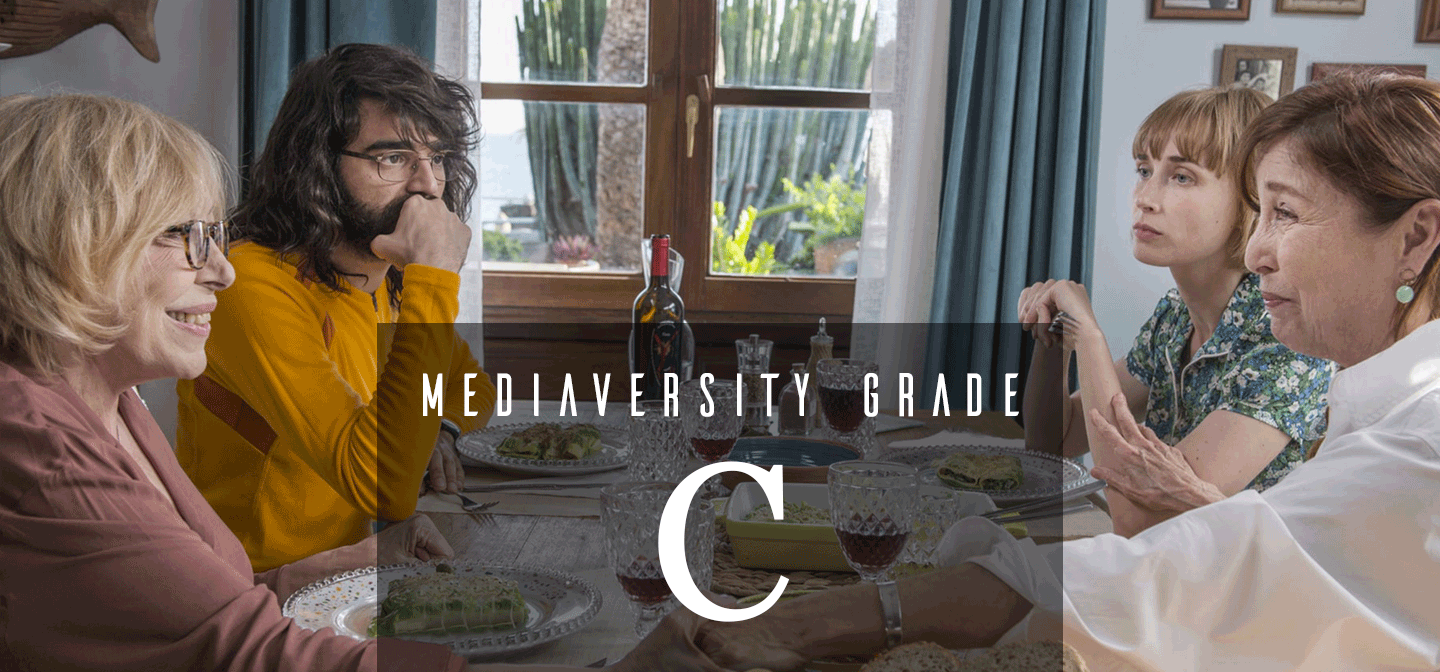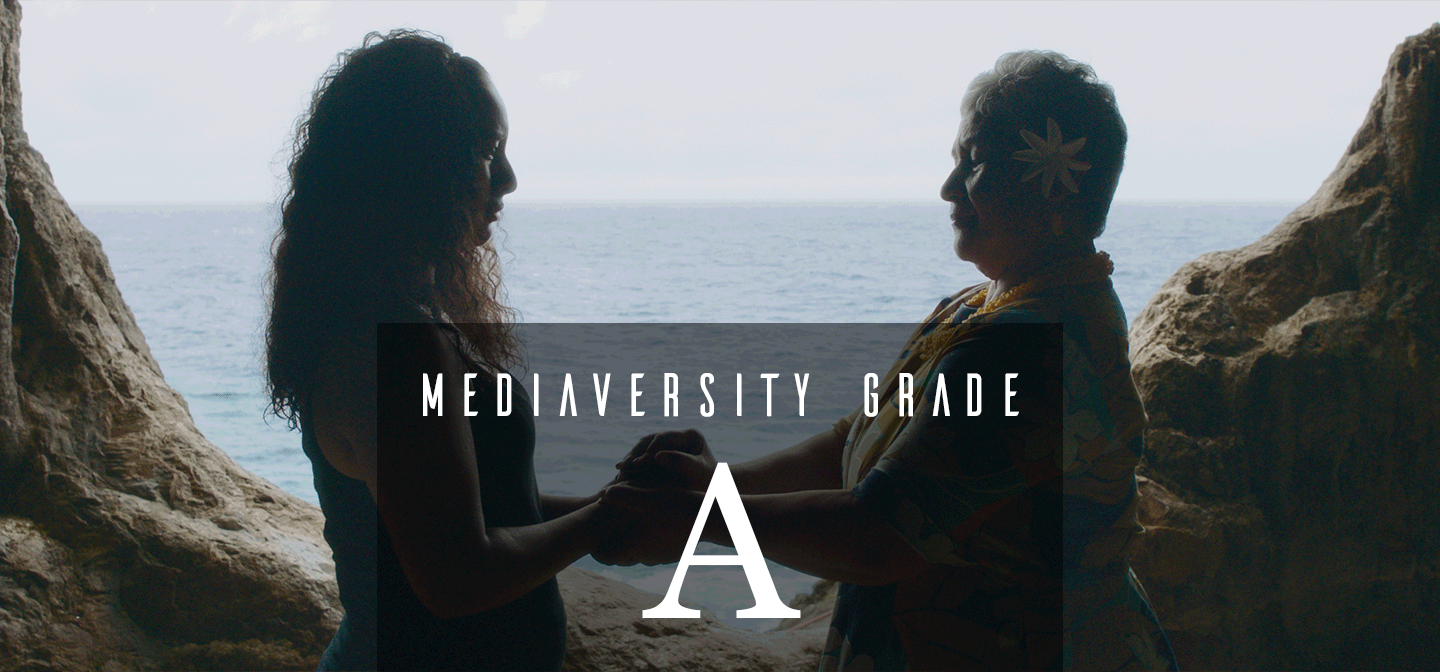So My Grandma's a Lesbian!
“By prioritizing a straight perspective, So My Grandma’s a Lesbian! pushes its queer protagonists to the sidelines.”
Title: So My Grandma's a Lesbian! (2019) / Spanish: Salir del ropero
Director: Ángeles Reiné 👩🏼🇪🇸
Writer: Ángeles Reiné 👩🏼🇪🇸
Reviewed by Alicja Johnson 👩🏼🇺🇸
Technical: 2/5
A trip to the Canary Islands sounds amazing right now, especially to those of us bundled up at home during another frigid winter. While that’s not an option for most, director-writer Ángeles Reiné can take you there with her debut feature film So My Grandma's a Lesbian!, which recently landed on Netflix in the United States.
The Portuguese-Spanish comedy follows a troupe of Spaniards helmed by Eva (Ingrid García Jonsson), a lawyer who has just gotten engaged to a wealthy Scotsman (Leander Vyvey). Although his highly conservative family means that their engagement party guests include supporters of Brexit and friends of Donald Trump, Eva is committed to making the marriage a success. When her grandmother Sofía (Verónica Forqué) calls with the news that she will soon marry her lifelong friend-turned-lover Celia (Rosa Maria Sardá), Eva fears that her fiancé and his family will kick her to the curb before the young lawyer can even try on a wedding dress. So she rushes to Sofía’s home in the Canary Islands to stop the wedding, aided by Celia’s grandson Jorge (David Verdaguer).
So My Grandma's a Lesbian! revels in breathtaking views of the Canary Island Lanzarote, and features a touching final performance from Maria Sardá who passed away last summer. Regrettably, however, Reiné stumbles into a common pitfall by underwriting her ensemble of characters, leaving the film without any substance to stand on.
Furthermore, So My Grandma's a Lesbian! closely resembles the 1967 classic Guess Who’s Coming To Dinner. It’s hard not to compare the two, which doesn’t flatter Reiné’s picture. For those unfamiliar, the 1967 movie takes place the night that an interracial couple intending to marry drops in on the young woman’s liberal white parents, who raised her to support civil rights and equality for all. The film asks the question that we still ask of liberals today: It’s easy to call yourself “tolerant” and to fight for just causes when they don’t affect you personally, but will you practice what you preach when they show up on your doorstep? So My Grandma's a Lesbian! asks Eva and Jorge this exact query about same-sex love between their grandparents, as the pair claim to be tolerant. Both movies arrive at a parallel conclusion: Though each marginalized couple will face discrimination and hardship, they can always count on the support of their respective families.
Unfortunately, Reiné’s script lacks both the comedy and insightful discussion included in Guess Who’s Coming to Dinner. But more than that, the modern-day setting of So My Grandma's a Lesbian! dooms its premise from the start. Six months before the release of Guess Who’s Coming to Dinner, the U.S. Supreme Court struck down bans on interracial marriage. This fortuitous timing helped make the movie both a commercial and critical success, as it was one of the first pictures to positively show an interracial marriage. Considering that Spain became the third country to legalize gay marriage back in 2005, the setup of So My Grandma's a Lesbian! feels 15 years too late. But even better timing wouldn’t solve the inconsistent characterization, predictable plot, and troubled writing that makes So My Grandma's a Lesbian! a total bore.
Gender: 4.75/5
Does it pass the Bechdel Test? YES
The film refreshingly passes the Bechdel Test within its first lines of dialogue, beginning a trend that lasts for much of its runtime. For this, we ought to credit Reiné who keeps Eva, Celia, and Sofía at the forefront of the story. Unfortunately, weak character development prevents our leading ladies from being as complex as one would hope.
Eva has the most detailed—yet still lacking—backstory of the ensemble. Left in the care of her grandmother Sofía at age 15, Eva resents her mother Natasha (Mónica López) and seeks to marry into such a conservative family because of their alleged “values,” some form of ethical code that she believes Natasha lacks. Alas, we see mere glimpses of this challenging relationship, but never any worthwhile reconciliation between the two. It’s also disappointing that we don’t get to see more of Eva’s relationship with Sofía, whom she purports to be close with.
I suspect Jorge is the reason that we miss out on Eva’s relationships with the two most important women in her life. From the moment he first almost hits her with his car—I say “first” because it does indeed happen again—we know that Eva will leave her fiancé for Jorge. Sure enough, their forbidden love story subsequently steamrolls every other relationship in the movie. Frustratingly, we learn more about his life than we do anyone else’s except for Eva.
Race: 1.5/5
So My Grandma's a Lesbian! features exactly three characters of color in miniscule roles, one of whom we don’t even see onscreen. Eva’s brother Said (Pol Monen) shows up midway through the movie with his Moroccan wife Salima (Maria Caballero) in tow. While we don’t know enough about her background to say for sure, the character seems to be whitewashed. Given Caballero’s distinctly Spanish last name, and that her agency lists Spanish as her native language (but not Arabic, the official language of Morocco), nothing suggests authenticity here. Caballero deliberately slows her Spanish to the pace of a non-native speaker, which further reeks of insincerity.
Plus, we can’t ignore the unnamed Mexican woman known only as “the shaman,” who practices alternative medicine and treats Sofía’s eccentric niece, Perla (Candela Peña). We never see this mysterious practitioner, but in the last 10 minutes of the film Perla spikes the Scotsman’s tea with a “treatment” from the shaman, believing that it will calm him down. It doesn’t. It makes him trip balls and take off all his clothes. This choice paints the shaman in an unflattering light that didn’t sit well, particularly considering Spain’s history of demolishing indigenous cultures in Mexico.
Finally, there’s Tom. Played by the Equatoguinean-Spanish actor Malcom Treviño-Sitte, Tom shows up out of thin air during the climax of the film, revealing himself as the romantic partner of Eva’s mother. He has about 2 minutes of screentime as comedic fodder, and if you removed him from the movie altogether, literally nothing about the plot would change.
Bonus for LGBTQ: +0.25
I like to imagine that Mediaversity writers have a “spidey sense” that goes on alert when diversity missteps are afoot. At least for me, hearing a comedy film titled So My Grandma's a Lesbian! immediately set off my alarm bells. Though the original title, Salir del ropero—meaning “coming out of the wardrobe”—is far less cavalier, my worries weren’t unfounded.
Reiné didn’t intend to create a film that would offend anyone from the LGBTQ community. Quite the opposite; in an interview (translated from Spanish) she states, “What I want is for the movie to provoke in the public a feeling of liberty, of reaching out to the neighbor, of having empathy for what others go through.” Yet while the movie ends on a message of tolerance, it takes a troubling route to get there.
We see some touching moments between Celia and Sofía, and they do get married in the end. But Eva’s illicit romance with Jorge usurps the narrative. The movie even includes a sex scene for the straight couple, while Celia and Sofía barely embrace, let alone kiss.
Despite its queer-friendly hook, the film embodies a straight worldview. From the get-go, the plot positions Sofía’s coming out as a disruption to Eva’s life, which results in some rather disgusting moments. For instance, when Celia and Sofía come out to Celia’s grandson Jorge, he responds in disbelief, running off to go drink with Eva. The camera then spends ample screen time observing the grandchildren’s gallivanting, occasionally cutting back to Celia and Sofía for seconds at a time for “comedic effect” to show the two anxiously praying for Eva and Jorge to return with their blessing.
Basically, the film takes a huge moment for most queer people—coming out to a loved one and hoping for their acceptance—and presents it through the lens of said loved ones bemoaning that “the only person I’ve ever trusted was lying to me.” (Yes, that is a verbatim quote.) Considering that many in the LGBTQ community still experience rejection of their identity by family members, it’s downright cruel that Reiné’s script transforms this pain into a joke.
Eva and Jorge aren’t the only dissenters to Celia and Sofía’s marriage. The town priest, Bienvenido (Alex O’Dogherty), also objects to the union and asks why the two can’t just love each other “in private.” Frustratingly, their fears make no sense given today’s climate. Jorge worries that the locals will ostracize them, despite 89% of Spaniards supporting same-sex rights in 2019. Bienvenido tells devoutly Catholic Celia that God will not accept their partnership, and of course Eva fears backlash from her future in-laws. By treating their clear homophobia as comedy, the movie downplays the very real effects of such behavior. The fact that Reiné tells this story through a straight lens makes the lack of sensitivity doubly gross.
I hate that I’ve spent this section speaking so much about the people around Celia and Sofía instead of the ladies themselves. But sadly that’s exactly the approach this film takes. Imagine how powerful it would have been to see Celia trying to reconcile her faith with her sexual orientation. Or to see Sofía struggling to take pride in her love for Celia, which the movie references but fails to explore. Had these women been the protagonists in their own love story, this could have been a drastically better movie.
Bonus for Age: +0.50
When was the last time you saw an onscreen romance between older characters? Or the last time you saw anyone over the age of 60 experience self-discovery in a fiction film? The examples are few and far between. So it’s lovely to see Forqué, 66, and Sardá, who passed at 78 last year, playing golden-agers who find new love and come to embrace their queerness. With that being said, the grandchildren act so condescendingly toward these women that it dampens the otherwise positive representation. Eva and Jorge question their choices, and Jorge even pressures Celia into getting a brain scan to check for mental illness after hearing her say that she takes phone calls with the Pope. Reiné also writes Celia as generally naive, feeding into the stereotype that aging dulls intelligence.
Mediaversity Grade: C 3.00/5
So My Grandma's a Lesbian! masquerades as a later-in-life coming out story, but its true heroine is a commiserable white woman who “courageously” learns to accept her grandmother’s same-sex marriage. It’s nice that Reiné wanted to make a movie about tolerance, but by prioritizing a straight white perspective, she pushes her queer protagonists and characters of color to the sidelines.




